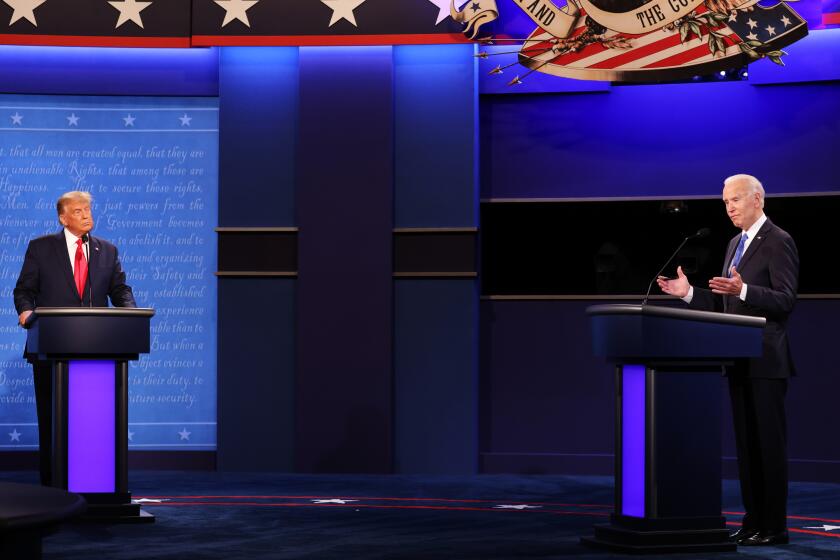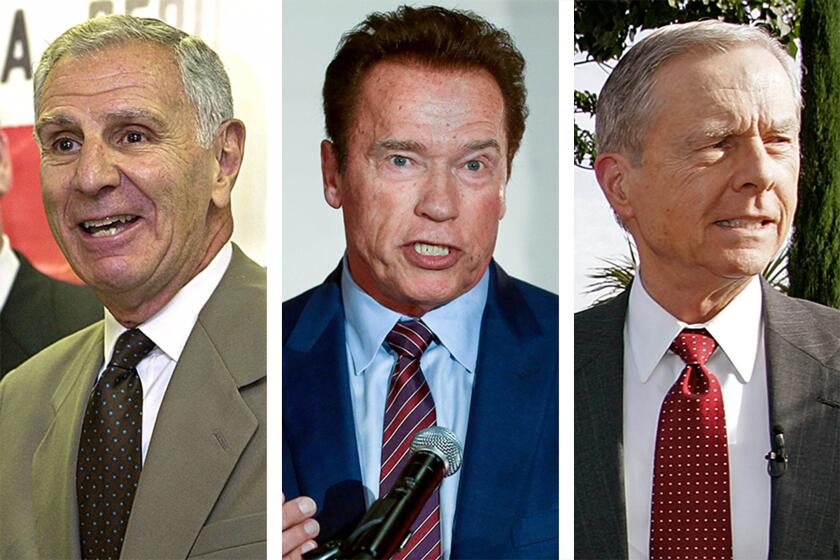Column: If you think 2020 chaos was bad, imagine if Trump was put in charge of elections

- Share via
On Jan. 6, 2021, Arizona lawmaker Mark Finchem — a practiced peddler of nutso conspiracy theories — stood outside the U.S. Capitol and tweeted his support for the mob seeking to overturn Joe Biden’s victory.
“What happens when the People feel they have been ignored, and Congress refuses to acknowledge rampant fraud,” Finchem wrote, pushing the election lie hatched in the Trump White House.
Returning home, Finchem not only supported the supposed “audit” of Biden’s 2020 win in Arizona but also found a way to make a fast buck off the Maricopa County clown show by selling T-shirts reading “#Proveit.”
So naturally, when it came time to support a candidate to oversee future Arizona elections, Donald Trump went all-in for Finchem, who marinates in QAnon Kool-Aid when he isn’t grifting or hanging out with members of the right-wing Oath Keepers militia.
“A man who is tough and smart and loves our country,” the former president said at his recent rally in the Arizona desert.
It would be funny if it weren’t so scary.
Subverting the foundation of free and fair elections has already done enough damage.
Finchem, a four-term member of the Arizona House, is part of a larger effort by Trump and his acolytes to hijack the country’s election machinery by putting loyalists in charge of the balloting in key states.
In several of the hardest-fought 2020 battlegrounds — Nevada, Georgia, Michigan and Wisconsin, as well as Arizona — Trump disciples are running for secretary of state, a typically obscure office that has gained tremendous import as the country’s cornerstone principle of free and fair elections comes under mounting attack.
Nationwide, there are more than a dozen Republican candidates running who question the legitimacy of Biden’s irrefutable election.
If you think the Trump-driven chaos that followed the last campaign was bad, 2024 could be monumentally worse. It’s the difference between a person being thwarted while attempting to break in and ransack a home and somebody being handed the keys to loot, then torch the house from within.
Think of the election system as a triangle consisting of rules, institutions and human beings, said Edward Foley, an elections law expert at Ohio State University. The rules should be as clear as possible. The institutions should be as nonpartisan, or at least bipartisan, as they can be. But ultimately, Foley said, “It is those human beings that populate the institutions that matter.”
The attempted takeover is separate from legislative efforts, fueled by Trump’s blabbering about supposed election fraud, that make it harder to vote. In many ways, it’s even more insidious.
In most states, the secretary of state is responsible for running elections, from the local level to the White House, including how votes are cast and, crucially, how they are counted. That person is usually the official responsible for certifying the final result.
That’s why Trump dialed up Georgia’s secretary of state, Brad Raffensperger, and urged him to “find” — wink — 11,780 votes, or enough to overturn Biden’s narrow victory in the Republican-leaning state. The district attorney in Atlanta is seeking a grand jury inquiry into the actions of Trump and others who sought to intimidate Raffensperger and undermine the election.
By refusing to go along, the incumbent landed himself a Trump-endorsed challenger, Rep. Jody Hice, who was among the 147 GOP lawmakers in the House who refused to certify Biden’s victory on Jan. 6. Hice referred to the insurrection as “our 1776 moment,” soiling both himself and the glory attached to that date in history.
In Nevada, Hice’s political soulmate is Jim Marchant, a former state assemblyman and candidate for secretary of state who has personal cred when it comes to making up election stuff: He unsuccessfully sued after losing a 2020 congressional race, making bogus claims of voter fraud.
Marchant recently told Stephen K. Bannon, the podcaster, former White House strategist and accused swindler whom Trump pardoned, of a “coalition” of Republicans working “behind the scenes to try to fix 2020 like President Trump said.”
Garbled verbiage aside, consider that statement a warning. Given the scant attention paid to secretary of state races, and the typically low voter turnout, Trump’s endorsement could carry considerable weight in Republican primaries. In some states, that could be enough to get elected. Then, the ex-president’s agents could cause all sorts of mayhem: lawsuits, never-ending audits, voting restrictions and partisan meddling, all dressed up as administration and oversight.
Not least, Trump loyalists would also have the opportunity to overturn any election results they don’t like.
The GOP needs better candidates and an agenda beyond kowtowing to Trump
In Arizona, the leader of House Democrats, Reginald Bolding, is one of several candidates running against Finchem for secretary of state in an open-seat contest. (GOP lawmakers reduced the powers of the office after Democrat Katie Hobbs pushed back against Trump’s bogus fraud claims. She’s now running for governor.)
In his announcement video, Bolding stated the obvious: “Elected leaders should win on the strength of their ideas, not their ability to game the system.”
The fact that principle is even in question speaks to the fraught times we’re living in.
More to Read
Get the latest from Mark Z. Barabak
Focusing on politics out West, from the Golden Gate to the U.S. Capitol.
You may occasionally receive promotional content from the Los Angeles Times.













